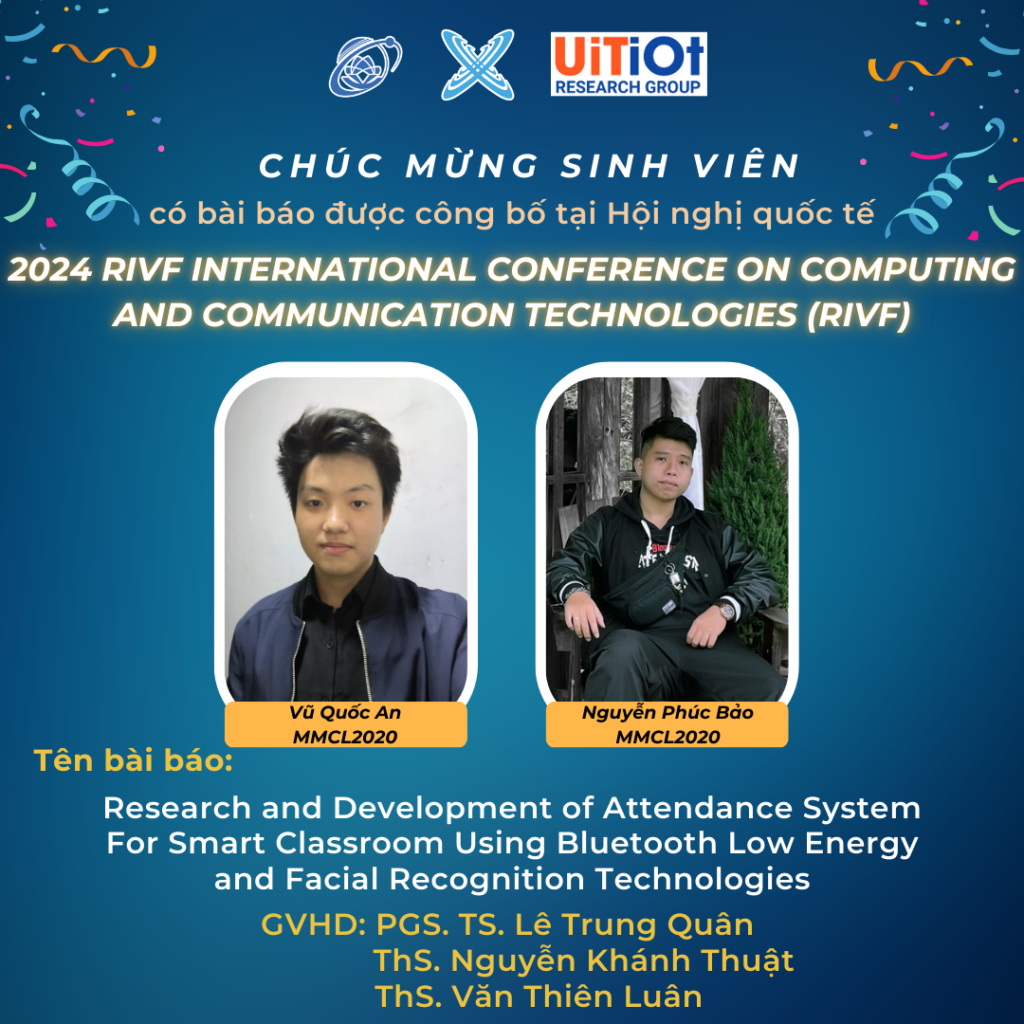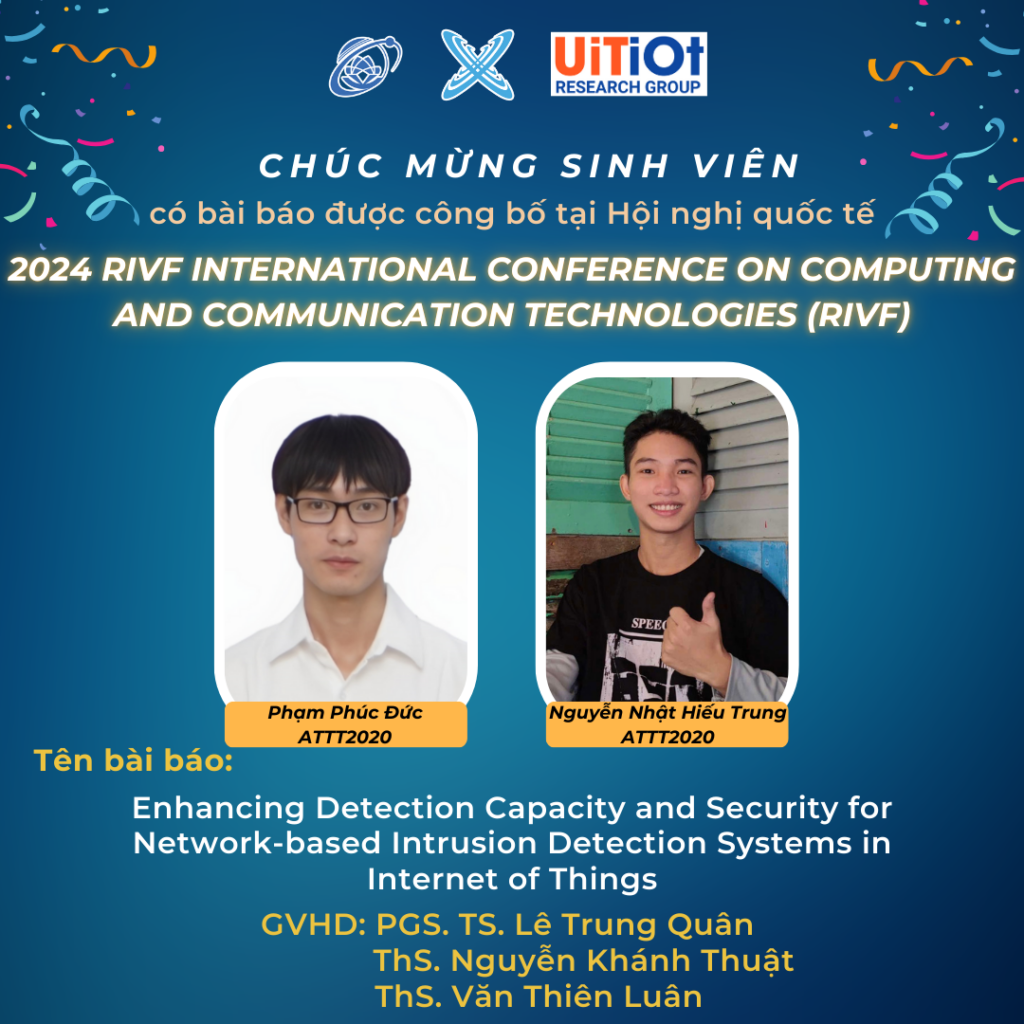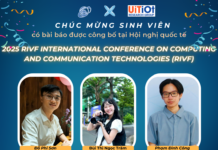Chúc mừng sinh viên Nhóm nghiên cứu UiTiOt đã có 02 bài báo khoa học được chấp nhận tại Hội nghị RIVF 2024 được tổ chức vào 21-23/12/2024 tại Trường Đại học Duy Tân, Tp. Đà Nẵng.
Bài báo 1: Research and Development of Attendance System For Smart Classroom Using Bluetooth Low Energy and Facial Recognition Technologies
– Sinh viên thực hiện:
+ Vũ Quốc An – MMCL 2020 – Tác giả chính
+ Nguyễn Phúc Bảo – MMCL 2020 – Đồng tác giả
– Giảng viên hướng dẫn: PGS. TS. Lê Trung Quân, ThS. Nguyễn Khánh Thuật và ThS. Văn Thiên Luân

Tóm tắt: Attendance is one of the crucial factors affecting students’ academic performance and reflecting their final grades. Therefore, an effective and accurate attendance marking method is necessary. Commonly used techniques such as roll call or signing in papers can result in forgery and consume class time. Even technology-based methods like Radio Frequency Identification (RFID) cards do not ensure transparency, as anyone can use the cards. We propose a smart attendance system using facial recognition technology to address these issues. Our approach aims to track student presence throughout the class, unlike current systems that only recognize faces once to mark attendance. We use You Only Look Once (YOLO) for face detection, FaceNet for feature extraction, and SVM for classification. Bluetooth Low Energy (BLE) is also implemented as a second data source from students’ mobile devices to verify presence in certain circumstances where facial recognition fails. Internet of Things (IoT) devices are deployed at the edge to collect and process data before sending it to the server. Multiple cameras and BLE stations are set up to ensure adequate information from the classroom for optimal results. We have successfully tested the system in a simulated classroom environment with seven members, recording cases of absence, entering and leaving the class, and the total participation time of each individual.
Bài báo 2: Enhancing Detection Capacity and Security for Network-based Intrusion Detection Systems in Internet of Things
– Sinh viên thực hiện:
+ Phạm Phúc Đức – ATTT 2020 – Tác giả chính
+ Nguyễn Nhật Hiếu Trung – ATTT 2020 – Đồng tác giả
– Giảng viên hướng dẫn: PGS. TS. Lê Trung Quân, ThS. Nguyễn Khánh Thuật và ThS. Văn Thiên Luân

Tóm tắt: As the number of Internet of Things devices continues to grow, so does the risk of attacks, which significantly impacts financial aspects and the potential loss of sensitive data. This makes Network-based Intrusion Detection Systems (NIDS) using machine learning algorithms more critical than ever. However, a key concern is the input data for the machine learning models. Most models require large datasets to achieve high accuracy, but this data often needs to maintain privacy if it includes personal information. Additionally, the trustworthiness of devices in the system must be ensured, as unreliable devices can reduce the model’s effectiveness or lead to significant data loss. To address these challenges, we propose using Generative Adversarial Networks (GAN) to enrich training data and combining Blockchain with Federated Learning (FL) to ensure data privacy and component validation. This approach results in a robust, efficient model that balances lightweight design with high reliability.
Homepage Hội nghị: https://rivf2024.duytan.edu.vn/
Thông tin Hội nghị:
Started in 2003, RIVF (Research, Innovation and Vision for the Future) has become a major scientific event for researchers in the field of Computing and Communication Technologies, not only in Vietnam but also worldwide.
In 2024, Duy Tan University (DTU) will host the conference from December 21-23, 2024 in Da Nang, Vietnam. It continues to offer an opportunity for researchers and innovators to discuss problems, share results, identify emerging issues, and establish academic collaborations in various disciplines of computing and communications.
The conference solicits submission of research papers in major areas of communication and computing, organized into five tracks. Relevant topics of each track include, but are not limited to:
**AI, Data Science, Big Data Analytics, Smart Computing, Intelligent Systems
**Language and Speech Processing
**Image, Computer Vision, Pattern Recognition
** Internet of Things (IoT), Internet of Everything (IoE), Edge Computing, Cloud Computing and Quantum Computing
** Autonomous Technologies and Future Driven AI Techniques
** Digital Twin and Metaverse
**Industrial Session track
**Cyber-Security, Cryptography, Blockchain & Applications





